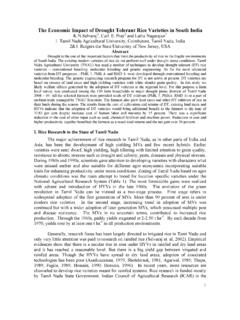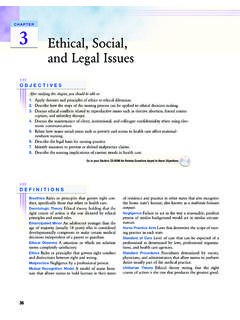Transcription of The economics of ethical behaviour and environmental ...
1 AARES 2000 Sydney th 44 Annual Conference of the AARES. January 23-25, 2000. The economics of ethical behaviour and environmental management Steven Schilizzi Agricultural & Resource economics The University of Western Australia Nedlands (Perth), WA 6907. ABSTRACT. Ethics and economics have long been viewed, if not as being incompatible, at least as being at odds with each other. This has often translated in the field of environmental policy and management into radical opposition between supporters of economic performance and environmentalists. It has seemed that the ethics of economics and that of environmental preservation were themselves at odds. The discussion has opposed utilitarian and duty-based philosophies. Ultimately, the firm manager, especially when under financial pressure, must decide between keeping the firm in business and doing the right thing for the environment. This view of things is now itself at odds with reality. One needs to explain why an increasing number of firms, both big and small, are setting up environmental management systems, making environmental investments and reducing risks over and beyond legal requirements, even when the benefits are not at all obvious, even in the long run.
2 Is it that economics and ethics have not only become compatible, but lend support to each other? If so, how is this possible? What are the social processes at work? And can we come up with a theoretical framework that can describe this new reality? Even at the philosophical level, are utility based and duty based ethics as contradictory as they seem? This paper investigates these questions and shows how, philosophically, the two ethics may be efficiently combined and how an analytical framework may be devised to explain society's new ethical incentives' and self-moralising processes. A. new role for government emerges. JEL Classification Numbers: Z10, A12, L20, M20, Q29. 1. 1. Introduction When, around 1990, the head of Nissan USA decided to completely reorganise car production at the plant with a zero waste objective and succeeded (McInerney & White, 1995); when Volvo's president decided to issue an environment report with clearly stated responsibilities for the future (Volvo Environment Report 1998); when the Swiss Ethos' foundation decided to select its investments according to the social and environmental performance of companies (Ethos 1999), and when members of the British USS superannuation pension scheme fight for a more ethical policy for the investments made on our behalf' (Ethics for USS, 1999), when these and many other such decisions were made, what exactly was motivating them?
3 In general, we considere the broadening of business concerns to include environmental management in light of what may be termed a utilitarian approach. That is, we try to highlight the potential benefits, for the firm and its direct stakeholders, of implementing an environmental management , reporting and auditing scheme. It is true, according to many reports (Donaldson 1992, McInerney & White 1995, and Donaldson & Gini 1996 describe several cases), companies have been able to increase their net benefits by doing so; but often, more as a happy by-product than by design. In all the examples cited above, the motivation was not only economic : it was ethical . This paper proposes to examine this other dimension of business and the environment. Actually, the question is twofold. Why are many firms committing themselves to environmental responsibilities, and why are many other firms not doing so? Is it that there is a conflict between economics and ethics, between environmentally clean business and profitability?
4 Is market competition a serious hindrance? What are the grounds for the exclusion by the Domini 400 Index of 150 companies from the Standard & Poor 500 list? This paper will show that the answers to these questions strongly depend on how costs and benefits are defined and accounted for, within what framework, what time horizon, what organisational structure. It will show that today environmental concerns, not only those of the civil society, but also those of the international business community1, are changing social values. These in turn are changing social expectations from business and thereby business ethics itself. However, environmental concern is perhaps but the latest force in changing business ethics. As the next section shows, business ethics has changed over time. This paper is organised as follows. The second section, after a brief historical reminder, highlights the main features of what has recently developed as the field of environmental ethics, and 1 For example, through implementation of the ISO 14000 series of norms.
5 2. provides some insights into its foundations. A third section examines environmental ethics from the corporation's perspective and how it relates to economic imperatives. A fourth section considers the current changes in the social forces of moralisation. A fifth section asks if environmental investments are ethical investments, and concludes on the significance of the processes merging ethics and economics . An appendix offers an illustrative case study. 2. Foundations of environmental ethics for business Historical overview Business in its modern sense, and business ethics with it, is a product of the industrial revolution th th of the 18 and 19 centuries in Europe and America. The use of the concept for periods before that time is therefore not quite appropriate. Nevertheless, there certainly had been, in practice, an implicit business ethics in commercial affairs, where certain values were upheld at least in times of peace. The Egyptians, the Phoenicians, the Greeks and, in the later Middle Ages, the Italian and Dutch merchants, as well as the tradesmen of the Hanseatic League, all followed specific deontologies.
6 Because of the locally integrated and sometimes tribal nature of trade, business also included many social concerns, mainly through the distribution of income and support of members throughout the community, the clan, or the family. environmental concerns seem, however, to have been the exclusive concern of the public authorities. In ancient Rome, and in the Paris and London of the Middle Ages, it was by the town councils, or by Imperial or Royal decree, that tanneries had to relocate because of the pollution they created. This may be attributed to the fact that, although pollution could be locally severe, it was not perceived as a general social problem. One reason for the lack of a general perception of pollution as a social problem was its small scale, compared to the healthy forests and countryside dominating the landscape in those days. Another reason seems to be the partitioning of society into social classes where the distribution of costs due to pollution fell almost entirely on the more destitute classes.
7 This coincided with the wealthier classes holding all the power and the lack of education, indeed of any literacy, of the poorer classes. The conceptualisation of pollution as a social problem could therefore only have been voiced by the ruling classes who had no immediate contact with the problem, and so no incentive to give it any further thought2. In this context, concern by the public authorities seems to have had two possible origins. The local pollution, like that from tanneries, was such that it affected more people than just the tanners themselves and their families. Another possibility was that the pollution affected the image and prestige th of the town and its rulers. Such seems to have been the case for Paris as early as the 13 century, and in th particular under Louis XI in the 15 . 2 Of course, this is a highly simplified account that historians could easily question in many particular cases;. nevertheless, it does seem to reflect the general state of affairs of pre-industrial times.
8 3. The impacts of social stratification and discrimination on environmental concerns carried over into businesses as well as out amongst nations. Within firms, the filthier and more unhealthy tasks were left to the socially disadvantaged, whereas management or ownership of the business belonged to the socially privileged. This was particularly marked in the farming and mining enterprises. This is still to a large degree true today, but the relationships between workers and management , as well as between them and the environment, has changed and is highly regulated by law and the public authorities. Amongst nations, colonialism certainly had its own ethics of resource exploitation. Lack of concern by dominating nations for the dominated was even harsher than that between social classes within one nation. Colonialism is, to a large extent, a long history of resource plundering and environmental disruption, even though there may have been local exceptions.
9 In the economist's terms, environmental and social externalities were, in both domains, totally disregarded. The industrial revolution had an ambiguous effect on business, ethics and the environment. On the one hand, it emphasised profit as a key economic goal and greatly aggravated environmental impacts, especially in a coal-driven economy. On the other hand, far more subtly, it generated the first inklings of environmental ethics, in relation with human health and living conditions. According to Max Weber, the th th 19 century German sociologist, modern business ethics as early as the 17 century was influenced by the Protestant ethic, mainly from countries around the North Sea. It has been argued that the Biblical heritage is one of domination of Nature by Man, though this assertion is open to interpretation: Grow and multiply, and submit the creatures of the earth . The heritage of pre-Christian religions amongst the Celtic and Germanic peoples, strongly revering primitive forces of nature, may have somewhat distorted the biblical heritage, but if so, in two opposing directions: increased economism and nascent environmentalism3.
10 The relationship was heavily blurred by social discrimination, as mentioned earlier, so that the environmentalist potential of the North Sea heritage had to wait for the social and economic th progress, as well as excesses, of the 20 century. At least, this is one possible interpretation of its voicing in the 1960s and its appearance as a social force in the 1970s. environmental ethics Two basic concerns for environmental ethics One may ask why a business firm should be concerned with the environment if it does not directly affect its profitability? After all, as was mentioned in the previous section, business has in the past mostly considered it was the government's job to deal with environmental impacts. This attitude does 3 See for example Jones & Pennick's book, A History of Pagan Europe , 1995, and how pagan pre-Christian nature-worship may be one of the roots of deep ecology a phenomenon of any magnitude only in the Celtic-Germanic influenced cultures of northern Europe and north America.



















